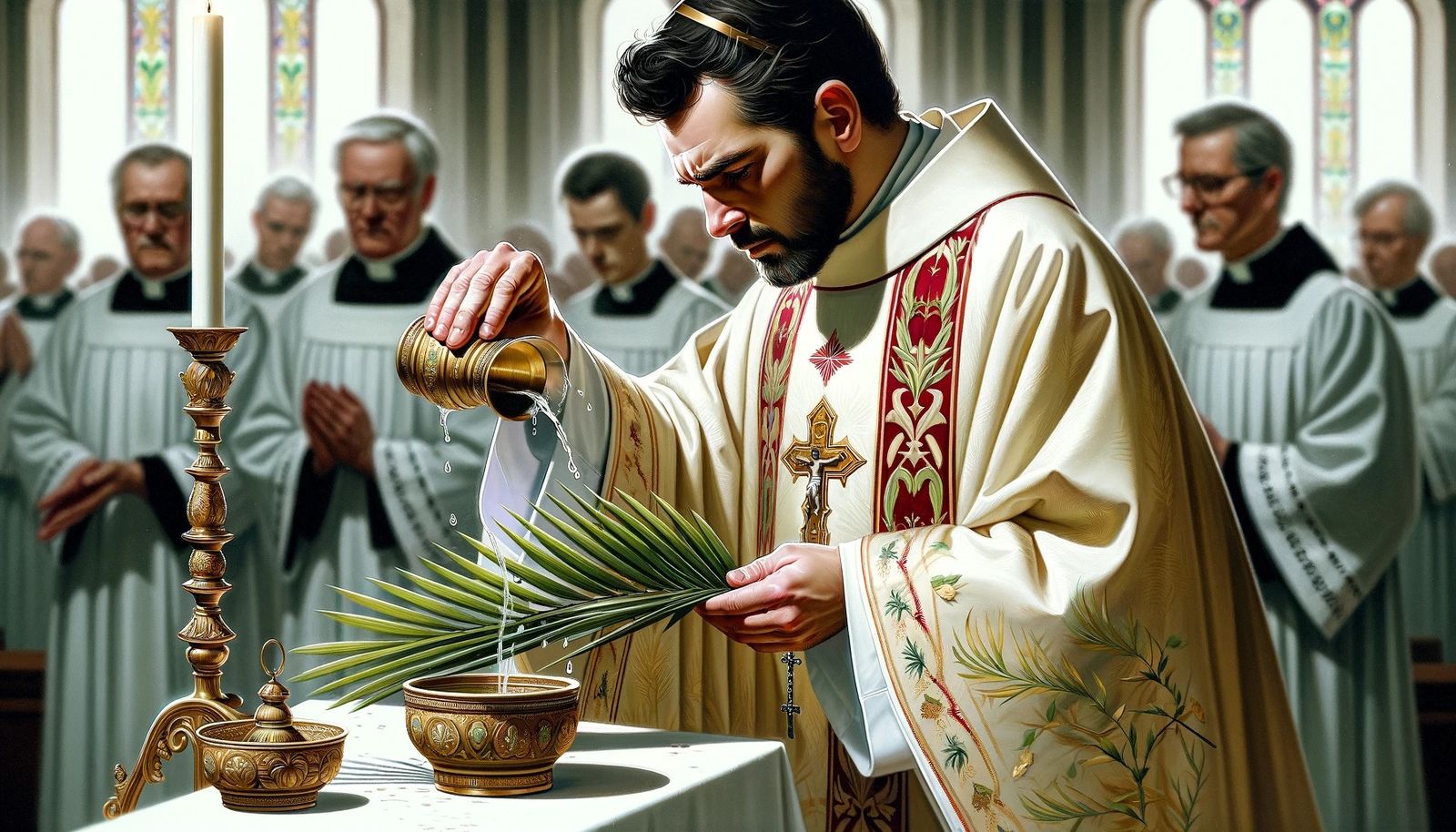Home>Theology and Spirituality>How Do You Practice Catholicism


Theology and Spirituality
How Do You Practice Catholicism
Published: February 18, 2024
Ericka Andersen, an editor at Christian.net, expertly merges digital strategy with content creation, focusing on faith and societal issues. Her communication skills enhance the platform's engaging narratives, fostering meaningful dialogue on belief's impact on society.
Discover the essence of Catholicism and deepen your spirituality with theology and spirituality practices. Explore the rich traditions and rituals of the faith.
(Many of the links in this article redirect to a specific reviewed product. Your purchase of these products through affiliate links helps to generate commission for Christian.net, at no extra cost. Learn more)
Table of Contents
Introduction
Catholicism, a rich and profound faith tradition within Christianity, encompasses a diverse tapestry of beliefs, practices, and rituals that have endured for centuries. For millions of adherents worldwide, Catholicism is not merely a religion but a way of life, guiding individuals through the complexities of existence and offering a framework for spiritual growth and moral development.
At its core, Catholicism centers on the life and teachings of Jesus Christ, as recorded in the Holy Bible and interpreted through the teachings of the Church. The Catholic Church, with its hierarchical structure and global presence, serves as a unifying force for believers, providing spiritual guidance, communal support, and a sense of belonging to a larger, interconnected community of faith.
The practice of Catholicism is characterized by a deep reverence for tradition, encompassing ancient rituals, sacraments, and liturgical celebrations that connect the faithful to the enduring legacy of their faith. From the solemnity of the Mass to the observance of holy days and seasons, Catholicism weaves a tapestry of sacred moments that punctuate the rhythm of daily life.
Moreover, Catholicism is a faith of both personal devotion and communal worship, encouraging individuals to cultivate a deep, personal relationship with God through prayer, reflection, and acts of charity, while also coming together as a community to celebrate and reaffirm their shared beliefs.
In this article, we will delve into the multifaceted dimensions of practicing Catholicism, exploring the various aspects that define and enrich the lived experience of Catholic faith. From attending Mass and receiving the sacraments to engaging in prayer, following Church teachings, and serving others, we will journey through the rich tapestry of Catholic spiritual life, seeking to understand the profound impact it has on the hearts and minds of its adherents.
Read more: How Do Catholics Practice Lent?
Understanding Catholicism
Catholicism, a prominent branch of Christianity, is distinguished by its rich tapestry of beliefs, traditions, and rituals that have evolved over two millennia. At its core, Catholicism is centered on the life, teachings, and sacrificial death of Jesus Christ, as revealed in the Holy Bible and interpreted through the teachings of the Church. The Catholic Church, with its hierarchical structure and global presence, serves as the spiritual and administrative focal point for millions of adherents worldwide.
Central to Catholic belief is the concept of the Holy Trinity, which acknowledges the threefold nature of God as Father, Son, and Holy Spirit. This foundational doctrine underscores the divine unity and diversity within the Godhead, serving as a cornerstone of Catholic theology.
Catholicism also places a strong emphasis on the authority of sacred tradition, alongside the Holy Scriptures, as a source of divine revelation. The teachings of early Church fathers, ecumenical councils, and the Magisterium (the teaching authority of the Church) are integral to the formation and interpretation of Catholic doctrine, providing a framework for understanding the faith within the context of history and tradition.
The sacramental nature of Catholicism is another defining feature, with seven sacraments—Baptism, Confirmation, Eucharist, Penance, Anointing of the Sick, Holy Orders, and Matrimony—serving as visible signs of God's grace, imparting spiritual nourishment and strength to the faithful. These sacraments are deeply woven into the fabric of Catholic life, marking significant milestones and moments of encounter with the divine.
Furthermore, the veneration of saints and the Blessed Virgin Mary holds a special place in Catholic devotion, reflecting a belief in the communion of saints and the intercessory power of these holy figures. Their lives and examples serve as sources of inspiration and models of faith for Catholics, fostering a sense of spiritual kinship and solidarity across time and space.
In essence, understanding Catholicism involves embracing a faith that is steeped in tradition, anchored in sacred scripture and tradition, and imbued with a sacramental worldview that permeates every aspect of the believer's life. It is a faith that seeks to reconcile the transcendent mysteries of God with the lived realities of human existence, offering a pathway to spiritual fulfillment and communion with the divine.
Attending Mass and Sacraments
Attending Mass holds a central place in the life of a Catholic, offering a sacred opportunity to participate in the Eucharistic celebration, which commemorates the Last Supper of Jesus Christ with his disciples. The Mass, often described as the "source and summit" of the Christian life, unfolds as a reverent and structured liturgical gathering, guided by the rhythms of prayers, readings from the Holy Scriptures, and the consecration of bread and wine into the body and blood of Christ.
The sacrament of the Eucharist, received during Mass, is regarded as the pinnacle of Catholic worship, symbolizing the real presence of Jesus Christ and fostering a profound spiritual union between the believer and the divine. Through the reception of the Eucharist, Catholics partake in the sacrificial offering of Christ and are nourished by the spiritual sustenance it imparts, strengthening their faith and deepening their connection to the Church and its teachings.
In addition to the Eucharist, the Catholic Church recognizes six other sacraments, each carrying its own significance and grace. Baptism, the sacrament of initiation, marks the entry of an individual into the faith community, cleansing them of original sin and initiating them into the life of Christ. Confirmation, often received during adolescence, strengthens the gifts of the Holy Spirit within the believer, empowering them to bear witness to their faith in the world.
The sacrament of Penance, also known as Reconciliation or Confession, offers the opportunity for Catholics to seek forgiveness for their sins, reconciling with God and the Church through contrition and penance. Anointing of the Sick provides spiritual healing and comfort to those facing illness or the frailty of old age, offering the grace of God's presence and strength in times of physical and emotional distress.
Holy Orders and Matrimony, the sacraments of service and vocation, respectively, confer special graces upon those called to ordained ministry and marriage, guiding them in their sacred duties and commitments within the Church and society.
The practice of attending Mass and receiving the sacraments is not merely a ritualistic observance but a profound expression of faith, fostering spiritual growth, communal unity, and a deepening of the believer's relationship with God and the Church. It is through these sacred encounters that Catholics are nourished, sanctified, and sustained on their journey of faith, finding solace, guidance, and grace in the sacramental life of the Church.
Prayer and Devotion
Prayer and devotion form the spiritual heartbeat of Catholic life, serving as the vital channels through which believers commune with the divine, seek guidance, and express their deepest longings and gratitude. At the core of Catholic spirituality is the practice of prayer, which encompasses a diverse array of forms, from structured liturgical prayers to personal, spontaneous conversations with God.
The Catholic tradition is replete with a rich tapestry of prayers, including the Lord's Prayer (Our Father), the Hail Mary, the Glory Be, and the Rosary, each carrying its own significance and symbolism. These prayers, often passed down through generations, serve as pillars of spiritual connection, uniting Catholics across time and space in a shared language of devotion and supplication.
In addition to formal prayers, Catholics are encouraged to cultivate a personal prayer life, engaging in moments of silent contemplation, meditation on sacred scripture, and heartfelt conversations with God. This intimate dialogue with the divine fosters a deepening of faith, a sense of spiritual intimacy, and an openness to receiving God's grace and guidance in the midst of life's joys and challenges.
Devotion to the Blessed Virgin Mary and the saints also holds a special place in Catholic prayer life, with believers seeking the intercession and companionship of these holy figures in times of need. The recitation of novenas, the lighting of votive candles, and the pilgrimage to sacred shrines are expressions of this heartfelt devotion, reflecting a profound trust in the spiritual solidarity and compassion of the saints.
The practice of devotion extends beyond formal prayers and rituals, encompassing acts of piety, such as making the sign of the cross, blessing oneself with holy water, and displaying religious imagery in homes and places of worship. These outward expressions of faith serve as constant reminders of the divine presence and the sacredness of everyday life, infusing the mundane with a sense of the transcendent.
Ultimately, prayer and devotion are not mere obligations but pathways to spiritual nourishment, inner peace, and a deepening of the believer's relationship with God. Through the practice of prayer and the cultivation of devotion, Catholics seek to align their hearts and minds with the divine will, finding solace, strength, and inspiration in the timeless rhythms of sacred communion.
Following Church Teachings and Traditions
Central to the practice of Catholicism is the steadfast commitment to following the teachings and traditions handed down by the Church through the ages. These teachings, rooted in sacred scripture, sacred tradition, and the authoritative guidance of the Magisterium, serve as guiding lights for Catholics, shaping their beliefs, moral outlook, and ethical conduct.
The Catechism of the Catholic Church stands as a comprehensive compendium of these teachings, offering a systematic presentation of the faith and moral teachings that form the bedrock of Catholic belief. It provides a framework for understanding the core tenets of the faith, including the beliefs in the Trinity, the divinity of Christ, the role of the Church, and the moral principles that govern human conduct.
Moreover, the observance of Church traditions, such as the liturgical calendar, the celebration of feast days, and the adherence to religious customs, fosters a sense of continuity with the faith of past generations. The liturgical seasons, including Advent, Lent, Easter, and Ordinary Time, punctuate the rhythm of the Catholic year, inviting believers to enter into the sacred mysteries of Christ's life, death, and resurrection in a cyclical manner.
The veneration of relics, the use of sacramentals, and the preservation of sacred art and architecture also serve as tangible expressions of Catholic tradition, connecting the faithful to the enduring legacy of their faith and the communion of saints. These traditions, while diverse in their forms, collectively reinforce the spiritual identity of Catholics and provide a sense of rootedness in a living, dynamic faith tradition.
Adherence to Church teachings and traditions extends beyond mere intellectual assent; it encompasses a lived commitment to embodying the values of the Gospel in everyday life. This includes upholding the sanctity of human life, promoting social justice, practicing charity and compassion, and striving for personal holiness in accordance with the teachings of Jesus Christ.
In essence, following Church teachings and traditions is not a passive adherence to dogma but an active engagement with the living tradition of the faith, shaping the moral conscience and ethical outlook of Catholics as they navigate the complexities of the modern world. It is a testament to the enduring relevance of the Catholic faith and its capacity to inspire and guide believers in their journey towards spiritual fulfillment and moral integrity.
Read more: Where Is Catholicism Most Practiced
Serving Others and Charity Work
Serving others and engaging in charity work lie at the heart of Catholic social teaching, embodying the fundamental call to love and care for one's neighbors, especially those who are marginalized, vulnerable, or in need. This ethos of service is deeply rooted in the life and teachings of Jesus Christ, who exemplified compassion, humility, and selfless giving in his interactions with the poor, the sick, and the outcast.
Catholicism places a strong emphasis on the corporal and spiritual works of mercy, which encompass concrete acts of assistance and support for those in physical and spiritual distress. The corporal works of mercy include feeding the hungry, giving drink to the thirsty, clothing the naked, sheltering the homeless, visiting the sick and imprisoned, and burying the dead. These acts of practical charity reflect a commitment to addressing the immediate material needs of individuals and communities, affirming the inherent dignity and worth of every person.
In addition to the corporal works of mercy, the spiritual works of mercy focus on attending to the emotional, relational, and spiritual well-being of others. These include instructing the ignorant, counseling the doubtful, admonishing sinners, bearing wrongs patiently, forgiving offenses willingly, comforting the afflicted, and praying for the living and the dead. Through these spiritual acts of compassion and support, Catholics seek to foster healing, reconciliation, and spiritual growth within their communities and beyond.
Charity work within the Catholic tradition extends beyond individual acts of kindness to encompass organized efforts of social justice, community development, and humanitarian aid. Catholic charities, relief organizations, and social service agencies play a pivotal role in addressing systemic injustices, poverty, and inequality, working to uplift the marginalized and advocate for the dignity and rights of all people.
Moreover, the commitment to serving others is not confined to specific initiatives or programs but is woven into the fabric of Catholic life, shaping the attitudes, values, and priorities of believers. It is a call to embody the love of Christ in tangible, transformative ways, recognizing the interconnectedness of all humanity and the shared responsibility to promote the common good.
In essence, serving others and engaging in charity work is a living expression of the Gospel imperative to love one's neighbor as oneself. It is a testament to the transformative power of compassion, solidarity, and justice, reflecting the enduring commitment of Catholics to build a more just, compassionate, and inclusive world for all.
Living a Moral and Ethical Life
Living a moral and ethical life is a foundational principle within the practice of Catholicism. At its core, this principle is rooted in the belief that individuals are called to embody the virtues of compassion, integrity, and justice in their interactions with others and in their decision-making processes. The moral framework of Catholicism is shaped by the teachings of Jesus Christ, as well as the ethical precepts and moral guidance articulated by the Church through its sacred tradition and authoritative teachings.
Central to the moral and ethical life is the adherence to the Ten Commandments, which serve as a moral compass for Catholics, guiding their actions and shaping their ethical consciousness. These commandments, which include directives to honor God, respect life, uphold the sanctity of marriage, and refrain from dishonesty and covetousness, provide a framework for ethical conduct and interpersonal relationships.
Furthermore, the Catholic moral tradition is characterized by a commitment to the principles of social justice, solidarity, and the preferential option for the poor and vulnerable. This ethical stance calls upon individuals to advocate for the rights and dignity of all people, especially those who are marginalized or oppressed, and to work towards the transformation of social structures that perpetuate inequality and injustice.
The cultivation of virtues, such as humility, honesty, compassion, and fortitude, is also integral to living a moral and ethical life. These virtues, which are exemplified in the lives of saints and spiritual exemplars, serve as guiding lights for Catholics, inspiring them to embody the values of the Gospel in their daily interactions and decision-making processes.
Moreover, the moral and ethical life in Catholicism extends to the realm of personal conscience and moral discernment. Catholics are called to cultivate a well-formed conscience, informed by the teachings of the Church, sacred scripture, and the guidance of the Holy Spirit, enabling them to make ethical choices that reflect a deep commitment to the common good and the well-being of others.
In essence, living a moral and ethical life within the context of Catholicism is a dynamic and ongoing process of moral formation, ethical discernment, and conscientious action. It is a call to embody the values of the Gospel in both personal and communal spheres, striving to create a more just, compassionate, and virtuous society guided by the principles of love, justice, and solidarity.
Conclusion
In conclusion, the practice of Catholicism encompasses a multifaceted tapestry of beliefs, traditions, and spiritual disciplines that profoundly shape the lives of its adherents. From the reverent observance of Mass and the sacraments to the cultivation of prayer, devotion, and ethical living, Catholicism offers a holistic framework for spiritual growth, moral integrity, and communal solidarity.
At the heart of Catholic practice lies a deep reverence for tradition, rooted in the timeless teachings of Jesus Christ and the enduring legacy of the Church. The sacraments, with their profound symbolism and grace-filled significance, serve as sacred conduits through which believers encounter the divine and are nourished on their spiritual journey. The rich tradition of prayer, both communal and personal, provides a means of intimate communion with God and the communion of saints, fostering a sense of spiritual intimacy and guidance.
Moreover, the commitment to following Church teachings and traditions underscores the moral and ethical dimensions of Catholic life, shaping the conscience and ethical outlook of believers as they navigate the complexities of the modern world. This ethical framework, grounded in the Gospel and the social teachings of the Church, calls upon Catholics to embody the virtues of compassion, justice, and solidarity in their interactions with others and in their advocacy for the marginalized and vulnerable.
The imperative of serving others and engaging in charity work reflects the Gospel mandate to love and care for one's neighbors, extending acts of mercy and compassion to those in need. This ethos of service, deeply ingrained in the Catholic tradition, underscores the transformative power of selfless giving and advocacy for social justice, embodying the call to build a more just and compassionate society.
In essence, the practice of Catholicism is a dynamic and multifaceted journey of faith, encompassing the sacred rhythms of worship, prayer, ethical living, and compassionate service. It is a testament to the enduring relevance of the Catholic faith and its capacity to inspire, guide, and transform the lives of its adherents, fostering a deep sense of spiritual fulfillment, moral integrity, and communal solidarity.














